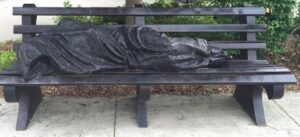
Jesus the Homeless. Statue by Timothy Schmalz.
I was hungry and you gave me food
I was thirsty and you gave me something to drink,
I was a stranger and you welcomed me,
I was naked and you gave me clothing,
I was sick and you took care of me,
I was in prison and you visited me.’
Matthew 25:35-36
We just launched Citizenship as a Spiritual Calling For Individuals and For Groups.
To contemporary, mainline Protestants, the idea that active civic engagement has any connection to spiritual discipline may seem incongruous. The notion that our Christianity belongs anywhere near our politics can even feel suspicious in a country that both over-politicizes religion and demands a separation between church and state. The relationship between our responsibilities as citizens and our Christian practices, in short, is complex for most of us.
In this class, Richard Hoehn suggests that, like it or not, our Christian beliefs should motivate robust political activism in a society governed by the people and for the people. Jesus says that the way we treat the least of his people is the way we treat him and even gives examples: food, drink, welcome, clothing, healthcare, prison. In our system, we decide to what extent the government will provide food security; whether regulations will protect clean water sources; how we will welcome immigrants and refugees; if (and how) sick people will gain access to healthcare; what laws will govern how prisoners are arrested; and how we treat prisoners when they are in custody. The state is the arm of the people. We can’t say that our responsibility to care for one another ends where the state begins when we are the state.
Richard, therefore, asks us to consider civic engagement as a spiritual calling. In his first lecture, he connects Christian values with civic responsibility. In his second lecture, he discusses examples of people living out the spiritual call to active citizenship and describes what that engagement looks like. Next, he suggests ways to build civic engagement as a spiritual discipline like any other spiritual discipline. Finally, he talks about congregations specifically, and how they can be a tool for civil discourse across political divisions.
This course is ideal for anyone interested in considering the relationship between our lives as citizens and our call to follow Christ.

 We have just launched
We have just launched